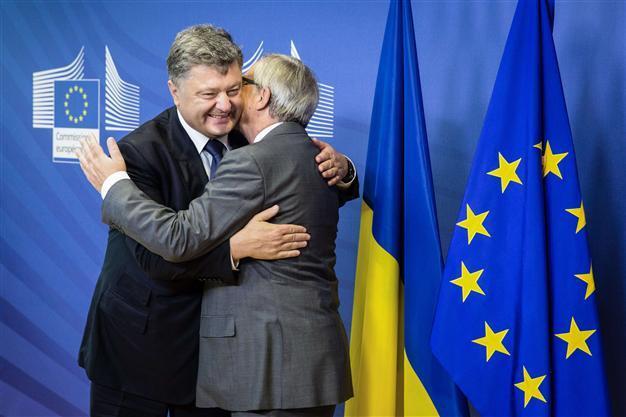Ukraine, creditors agree debt restructuring deal
KYİV - Agence France-Presse

AFP photo
Ukraine said on Aug. 27 it had reached a crucial debt restructuring deal that will see lenders accept a 20-percent write-down and keep global markets open to the cash-strapped ex-Soviet state.The announcement marks a monumental victory for Finance Minister Natalie Jaresko, a U.S.-born financial expert whom President Petro Poroshenko plucked from a Kyiv investment firm in December and tasked with saving the war-torn country from hurtling into default.
Prime Minister Arseniy Yatsenyuk described the agreement as a blow to “enemy” Russia.
Franklin Templeton and three other financial titans that own nearly half of the $19 billion (16.8 billion euros) in commercial debt under discussion had argued that the east European nation was in strong enough shape to repay what it owed in full.
“I think it’s a historic success for Ukraine, I think for emerging markets generally,” Jaresko told AFP in an interview shortly before Yatsenyuk made the formal announcement at a televised government meeting.
The painful talks lasted for five months and saw the International Monetary Fund and the United Sates put immense pressure on the bondholders to accept short-term losses in return for preserving Ukraine’s pro-Western leaders from being forced into resuming their reliance on Russia.
Ukraine’s growth is expected shrink by nearly 10 percent due in part to the loss of key coal and steel mining factories in the pro-Russian separatist east that saw industrial production plummet by about a fifth over the first six months of the year.
“Why is (the deal) important? Ukraine like any family can only borrow so much. And then at some point those people, organizations that lend you money, don’t want to lend anymore, because you are not creditworthy,” Jaresko said in the English-language interview.
“We were already at the point as a country where the commercial creditors said: ‘Too risky.’ Now the official creditors said: ‘Within limits, we will support you.’”
The possibility of Ukraine either outright defaulting on its obligations or imposing a payment freeze could have shut Kyiv out of global borrowing markets and severely hampered its IMF-led austerity and economic restructuring drive.
The IMF had patched together a $40 billion rescue package aimed at a stabilizing the country’s financial footing after more two decades of corruption saw its economy shrink from levels seen in Soviet times.
But that deal required a compromise with bondholders that could save the nation of about 40 million people $15.3 billion over the next four years.
















